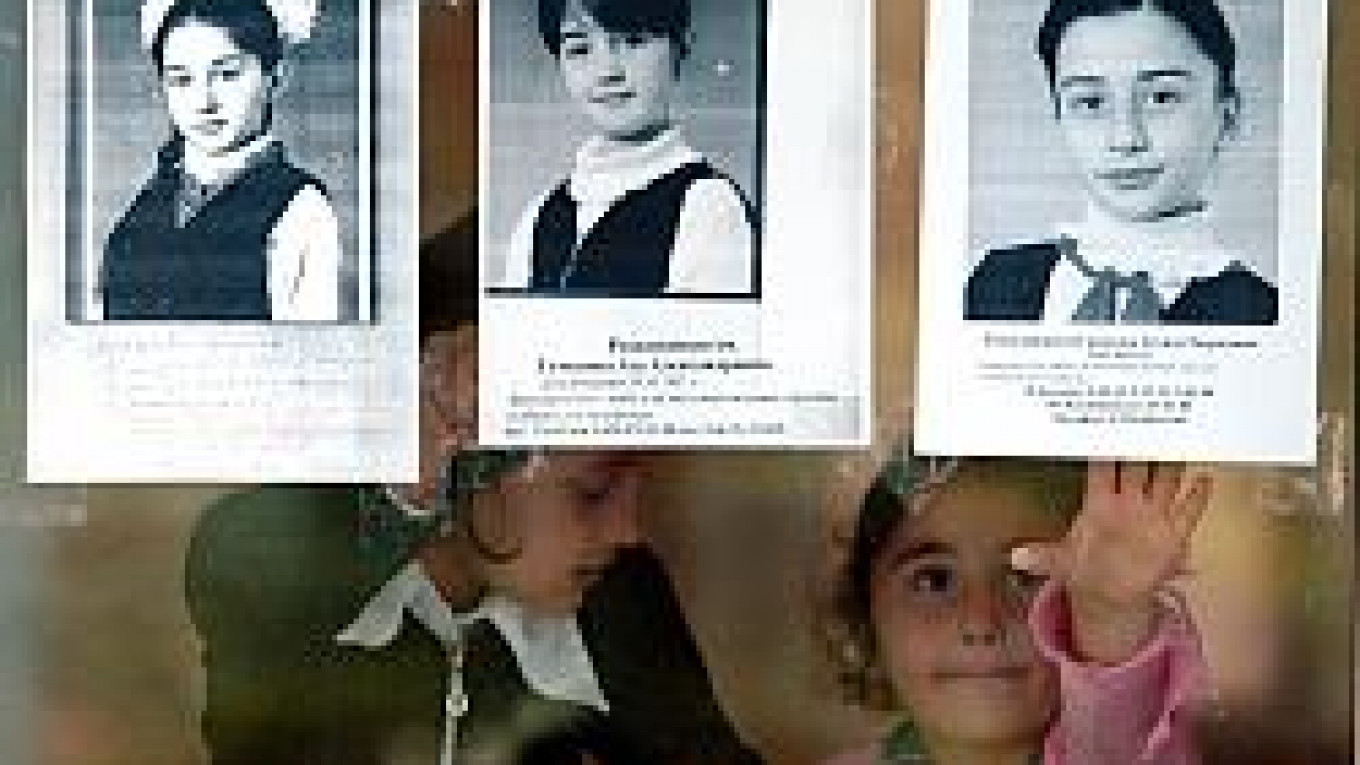Hostages concurred Monday that fighting only began after a heavy bomb fell off the hoop in the gymnasium and detonated. The attackers had herded many of the 1,100 hostages into the gym in the first minutes of the crisis and taped bombs to a line between two basketball hoops and the hoops themselves.
One hostage said the falling bomb hit the head of a teenage girl lying under a basketball hoop before it exploded.
At that very moment, four Emergency Situations Ministry officers were approaching the school under an arrangement with the attackers to pick up bodies that had been lying in the schoolyard since the crisis started.
Authorities said attackers standing guard at the windows opened fire, believing that the blast in the gymnasium and the approaching rescuers signaled the beginning of an operation to storm the school. Two rescuers were killed on the spot.
As shell-shocked hostages started pouring out of the gym's shattered windows, the attackers started firing frantically at them.
Pandemonium then broke out. Special forces, local police and armed civilians responded by opening fire over the heads of the fleeing hostages.
The battle could have been prevented if civilians had obeyed orders to hold their fire, said former Ingush President Ruslan Aushev, who was in Beslan to negotiate the release of hostages.
The attackers told him by phone that they would stop shooting if those on the outside also stopped, Aushev said in an interview published in Novaya Gazeta on Monday.
Servicemen forming a cordon around the school were ordered to stop firing, but the civilians continued shooting, he said.
Unsure of what would happen next, the attackers detonated their explosives in the school.
The grim result was at least 335 people dead -- including 156 children -- and more than 540 wounded, state-controlled Rossia television reported Monday, providing the latest update on Friday's toll. It said 192 people were buried Monday.
A total of 332 people remained hospitalized, including 202 children, the North Ossetian Health Ministry said.
About 200 people were missing, RIA-Novosti reported.
While accounts from hostages, soldiers and government officials support the version that the falling basketball bomb set off the battle, some North Ossetian law enforcement officials suggested that the explosion was deliberate and part of an escape plan by several of the attackers.
Citing local OMON officers, Kommersant reported Monday that the attackers planned to lure the rescuers into the school, kill them, put on their uniforms and attempt to flee by car.
This version is indirectly supported by reports in Izvestia on Monday that gunfire preceded the blast inside the school. Hostages have said that the attackers frequently fired their guns to intimidate them.
Deputy Prosecutor Sergei Fridinsky reiterated Monday that 32 attackers had seized the school and 30 of them had been killed. He said one attacker was in custody.
Izvestia said two attackers were lynched by the civilians -- one as he attempted to escape and the other after being pulled out of a police car by the angry crowd.
The first attacker was killed by a local police officer during the seizure of the school Wednesday, Izvestia said.
Kommersant said Monday that from one to three hostage-takers might have escaped.
Fridinsky said that there were Chechens, Ingush, Tatars, Kazakhs and Koreans among the attackers. Earlier, the head of the North Ossetian branch of the Federal Security Service, Valery Andreyev, claimed that 10 of the attackers were Arabs, one of them black.
Aushev said the attackers during negotiations had refused to speak Vainakh, the language spoken both by the Ingush and Chechens, and used only Russian.
 Dmitry Norov / Reuters A nurse caring for hostage Kristina Khabliyeva at a Rostov-on-Don hospital Monday. | |
Hostages said the attackers spoke Russian among themselves.
Authorities so far have established the identity of only one attacker, Ossetian criminal-turned-rebel Anatoly Khodov, 28. He was a suspect in two terrorist attacks in North Ossetia earlier this year, and his fingerprints were in the databases of the local police, Kommersant said.
Gazeta identified the detained attacker as Nur-Pashi Kulayev, 24, a native of the Chechen village of Stary Engenoi.
Three other attackers, including Kulayev's elder brother Khan-Pashi, also came from this village.
The Kulayevs are believed to be bodyguards and confidants of Chechen warlord Shamil Basayev, who has claimed responsibility for a number of terrorist attacks, including the hostage-taking raid on Moscow's Dubrovka theater in October 2002.
Nur-Pashi Kulayev is actively cooperating with investigators in identifying other attackers, Channel One television reported.
Rossia on Monday showed him saying that Basayev and Chechen rebel leader Aslan Maskhadov had ordered the raid.
A Kommersant reporter said he recognized Magomed Yevloyev, leader of the Ingush Wahhabi, among the bodies of the attackers lying in the schoolyard after Friday's battle.
Yevloyev is thought to have led raids in Ingushetia on June 21-22 that killed almost 90 people.
Kulayev said a Basayev bodyguard was among the attackers, a Slav known only as Fantomas, Kommersant reported.
He did not confirm the participation of Chechen warlord Doku Umarov, who was linked to the raid in earlier reports.
The attackers arrived at the school in a hijacked police truck. They took a police officer, Sultan Gurazhev, hostage on their way to Beslan and he later managed to escape, earlier news reports said. Kommersant said Monday that Gurazhev had been questioned by Beslan police and released.
Rebel web site Kavkazcenter.com reported Sunday that the federal security forces were arresting relatives of Maskhadov. No Russian news media carried this information.
Meanwhile, Itar-Tass reported that in addition to a huge number of hostage deaths, the school crisis claimed a record number of officers in the elite Alfa and Vympel special forces. Ten officers died and 26 were wounded in Friday's battle, most of them as they tried to cover fleeing hostages with their bodies, the head of the veterans organization for special services, Eduard Bendersky, was quoted as saying.
A Message from The Moscow Times:
Dear readers,
We are facing unprecedented challenges. Russia's Prosecutor General's Office has designated The Moscow Times as an "undesirable" organization, criminalizing our work and putting our staff at risk of prosecution. This follows our earlier unjust labeling as a "foreign agent."
These actions are direct attempts to silence independent journalism in Russia. The authorities claim our work "discredits the decisions of the Russian leadership." We see things differently: we strive to provide accurate, unbiased reporting on Russia.
We, the journalists of The Moscow Times, refuse to be silenced. But to continue our work, we need your help.
Your support, no matter how small, makes a world of difference. If you can, please support us monthly starting from just $2. It's quick to set up, and every contribution makes a significant impact.
By supporting The Moscow Times, you're defending open, independent journalism in the face of repression. Thank you for standing with us.
Remind me later.


